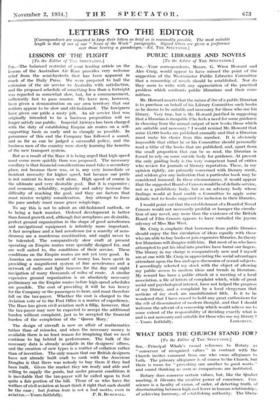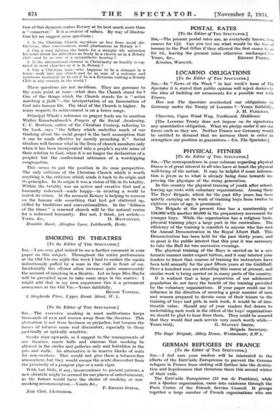WHAT DOES THE CHURCH STAND FOR ?
[To the Editor of THE SPECTATOR.] SIR,—Principal Whale's casual reference to Rotary as " conserver of recognized values " in contrast with the Church invites comment from one who owns allegiance to both. The primary allegiance is of course to the Church, but there is room for " provoking one another to good works " and sound thinking as soon as comparisons are instituted.
Rotary does conserve certain values, but, like the Quaker meeting, it liberates the creative power of conscience. Con- science is a faculty of vision, of order, of detecting truth, of discriminating between high and lower in human relationshipi, of achieving harmony, of establishing authority. The libera- tion of this dynamic makes Rotary at its best much more than a " conserver." It is a creator of values. By way of illustra-' tion let me suggest some questions : 1. Is the Christian Church anywhere as free from social dis- tinctions. class consciousness, small pharisaisms as Rotary is ?
2. Can a man fighting the battle for a straight life unburden his mind about his difficulties as freely in a church as in a Rotary club—and be as sure of a sympathetic hearing ?
3. Is the international element in Christianity as frankly recog- nized in most churches as it is in Rotary 4. Can a Christian man—who happens to be a stranger in town—walk into any church and be as sure of a welcome and courteous treatment as he can if he is a Rotarian visiting a Rotary Club in any country in the world ?
These questions are not invidious. They arc germane to the main point at issue—what does the Church stand for ? One of the things which the Church stands for is " action matching a faith"—the interpretation of an Incarnation of God into human life. The ideal of the Church is higher. In
many respects its achievement is on a lower range.
Principal Whale's reference to prayer leads me to mention Walter Rauschenbusch's Prayers of the Social Awakening. C. C. Morrison, editor of the Christian Century, referring to the book, says " the fallacy which underlies much of our thinking about the social gospel is the tacit assumption that
it can be made effective by merely preaching it." Social idealism will become vital in the lives of church members only when it has been incorporated into a people's mystic sense of their relation to God, when it is no longer the declaration of a prophet but the confessional utterance of a worshipping congregation.
This seems to put the position in its sane perspective. The only criticism of the Christian Church which is worth anything is the criticism which sends it back to its origin and its principles. In its origin it was a vision of life in its totality. Within the totality was an active and creative God and a humanity redeemed—made happy—in creating a world to match its vision. At the moment Rotary is helping to recover on the human side something that had got cluttered up, stifled by traditions and conventionalities. In the "fullness of the times " a renewed church will be the natural centre for a redeemed humanity. But not, I think, yet awhile.—
Bramble Bank, Alington Lane, Letchzcorth, Herts.















































 Previous page
Previous page